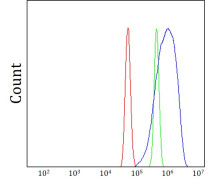ARG43887
anti-ASC / TMS1 antibody
anti-ASC / TMS1 antibody for ELISA,Flow cytometry,ICC/IF,Western blot and Mouse
Overview
| Product Description | Rabbit Polyclonal antibody recognizes ASC / TMS1 |
|---|---|
| Tested Reactivity | Ms |
| Tested Application | ELISA, FACS, ICC/IF, WB |
| Host | Rabbit |
| Clonality | Polyclonal |
| Isotype | IgG |
| Target Name | ASC / TMS1 |
| Antigen Species | Mouse |
| Immunogen | Mouse ASC / TMS1 recombinant protein |
| Expression System | E.coli |
| Conjugation | Un-conjugated |
| Protein Full Name | Apoptosis-associated speck-like protein containing a CARD |
| Alternate Names | PYCARD; PYD And CARD Domain Containing; CARD5; ASC; Apoptosis-Associated Speck-Like Protein Containing A CARD; TMS-1; Caspase Recruitment Domain-Containing Protein 5; Target Of Methylation-Induced Silencing 1; TMS1; PYD And CARD Domain-Containing Protein; Apoptosis-Associated Speck-Like; HASC; TMS |
Application Instructions
| Application Suggestion |
|
||||||||||
|---|---|---|---|---|---|---|---|---|---|---|---|
| Application Note | * The dilutions indicate recommended starting dilutions and the optimal dilutions or concentrations should be determined by the scientist. |
Properties
| Form | Liquid |
|---|---|
| Purification | Affinity purified with Immunogen. |
| Buffer | 0.9% NaCl, 0.2% Na2HPO4 and 4% Trehalose. |
| Stabilizer | 4% Trehalose |
| Concentration | 0.5 mg/ml |
| Storage Instruction | For continuous use, store undiluted antibody at 2-8°C for up to a week. For long-term storage, aliquot and store at -20°C or below. Storage in frost free freezers is not recommended. Avoid repeated freeze/thaw cycles. Suggest spin the vial prior to opening. The antibody solution should be gently mixed before use. |
| Note | For laboratory research only, not for drug, diagnostic or other use. |
Bioinformation
| Gene Symbol | PYCARD |
|---|---|
| Gene Full Name | PYD And CARD Domain Containing |
| Background | This gene encodes an adaptor protein that is composed of two protein-protein interaction domains: a N-terminal PYRIN-PAAD-DAPIN domain (PYD) and a C-terminal caspase-recruitment domain (CARD). The PYD and CARD domains are members of the six-helix bundle death domain-fold superfamily that mediates assembly of large signaling complexes in the inflammatory and apoptotic signaling pathways via the activation of caspase. In normal cells, this protein is localized to the cytoplasm; however, in cells undergoing apoptosis, it forms ball-like aggregates near the nuclear periphery. Two transcript variants encoding different isoforms have been found for this gene. |
| Function | Modulates host resistance to DNA virus infection, probably by inducing the cleavage of and inactivating CGAS in presence of cytoplasmic double-stranded DNA. |
| Cellular Localization | Cytoplasm, Endoplasmic reticulum, Golgi apparatus, nflammasome, Membrane, Mitochondrion, Nucleus |
| Calculated MW | 22 kDa |
| PTM | Isopeptide bond, Phosphoprotein, Ubl conjugation |
Images (3) Click the Picture to Zoom In
-
ARG43887 anti-ASC / TMS1 antibody WB image
Western blot: Mouse spleen and Mouse thymus stained with ARG43887 anti-ASC / TMS1 antibody at 0.5 μg/ml.
-
ARG43887 anti-ASC / TMS1 antibody ICC/IF image
Immunofluorescence: RM1 cells stained with ARG43887 anti-ASC / TMS1 antibody at 5 μg/ml dilution.
-
ARG43887 anti-ASC / TMS1 antibody FACS image
Flow Cytometry: RAW264.7 cells stained with ARG43887 anti-ASC / TMS1 antibody (blue) at 1 μg/1x10^6 cells dilution.








